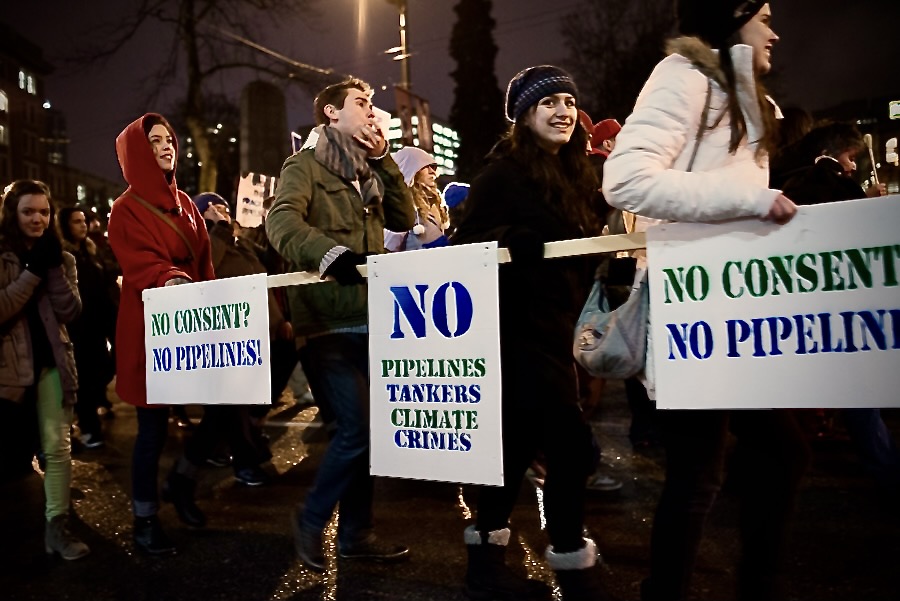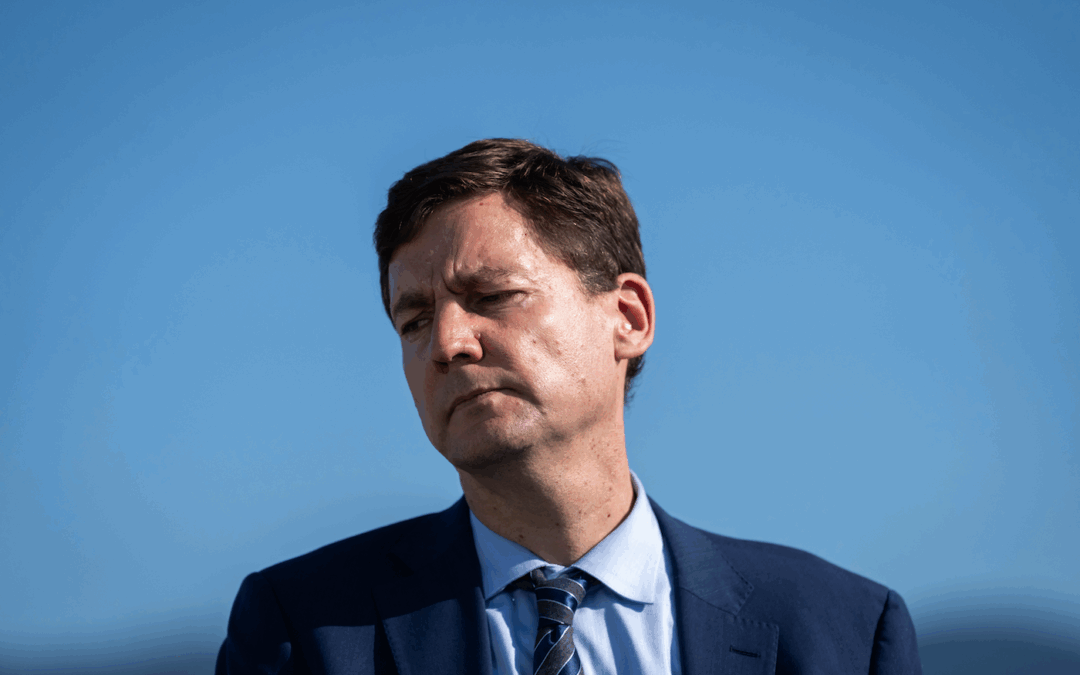Photo: BC Premier David Eby, above at a September Ksi Lisims LNG announcement, says the Alberta pipeline proposal unveiled Thursday threatens shovel-ready national projects on coast / CNO File photo by: Ethan Cairns / The Canadian Press
By Rochelle Baker
Local Journalism Initiative Reporter
Canada’s National Observer
Prime Minister Mark Carney’s agreement with Alberta for a potential pipeline has unleashed a tsunami of opposition on the West Coast.
BC Premier David Eby described the federal memorandum of understanding (MOU) crafted with Alberta Premier Danielle Smith on Thursday as an “energy vampire” and a “distraction” that could compromise real ready-to-deliver projects in the province.
Unlike the Alberta pipeline proposal that has neither a proponent, route, nor private financial backer — and that is dogged by strong First Nations opposition — BC has a suite of projects advanced and underway that will benefit all of Canada, Eby said, including LNG projects, port expansions, the North Coast Transmission Line and an associated $50 billion in mining projects.
“My anxiety about the pipeline proposal … is that it runs a very significant risk that has already partially been realized of taking our eye off the prize, distracting the federal government, distracting resources and pulling time away from real projects that can be delivered in the near term,” Eby said, adding that federal resources would be better spent securing the final investment decision and progressing the LNG Canada Phase 2 project that currently sits on Carney’s major projects list.
The pipeline agreement was crafted without any involvement from the province or First Nations. Their support and social licence, Eby noted, is critical to the success of the projects of national interest in northern BC.
Talking to Smith and Carney on Wednesday, Eby said he delivered BC’s “consistent message” about its opposition to lifting the legislated oil tanker ban on the northern coast, as well as the need to include Coast First Nations in any discussions.
“[Coastal nations] need to be a part of this conversation,” Eby said. “They are the cornerstone of billions of dollars of investment in our province, thousands of jobs that are going to go forward, and they need to be engaged.”
The pipeline MOU stipulates any project must have private sector investment.
“I don’t think one taxpayer dollar should go into this project, and I’m glad to see in the agreement that’s a condition, and I think it’s probably fatal to Premier Smith’s proposal,” Eby said.
Though Carney made previous assurances in Parliament that BC and First Nations support would be needed for any pipeline, Eby said a careful reading of the agreement “is silent on both issues.” The agreement includes mention of Indigenous co-ownership, but does not specify anything related to consent.
The BC Green Party slammed the pipeline proposal as a political “Hail Mary” for Smith that risks repeating the Trans Mountain Pipeline boondoggle, where taxpayers were left on the hook after the federal government had to purchase the $34-billion-plus pipeline that industry wasn’t willing to complete.
“A decade after the Trans Mountain Pipeline disaster and billions in taxpayer dollars wasted, we’re walking the same tired path again,” said Rob Botterell, MLA for Saanich North and the Islands.”
“This pipeline MOU is nothing more than a lifeline to the few supporters the Premier of Alberta has left, still clinging to the nostalgia of [popular former premier Peter] Lougheed’s era.”
The project is an “absurd proposition” that risks BC’s coastline, the party said in a statement, adding a project that opposes the wishes of the province and First Nations couldn’t be classified as “nation-building.”
“Real nation-building brings people in; it doesn’t bulldoze past them,” Botterell said.
Jeremy Valeriote, Green MLA for West Vancouver-Sea to Sky, said BC’s northern coast waters are some of the “most dangerous in the world” and talk of a new pipeline isn’t in step with “global environmental and economic realities.”
“A new crude oil pipeline isn’t just economically absurd — it’s irresponsible. Crude oil demand is going extinct,” he said.
“It’s simply reckless to ship heavy oil through them and along a pristine coastline of such economic and cultural significance amid record-breaking wildfires, drought and climate instability.”
Pipeline would draw a new wave of protest

The former Northern Gateway Pipeline project to get Alberta oil to BC’s coast was derailed by widespread opposition and protests in BC.
Reaction from BC environmental organizations, many involved with First Nations in the long battle to scuttle the Northern Gateway pipeline proposal, was scathing.
Shelley Luce, campaigns director for Sierra Club BC, criticized the pipeline proposal as a “meaningless publicity stunt.”
The financial impracticality of a pipeline project, given the global shift toward renewable energy and that the existing TMX pipeline is still not at capacity, means private-sector financing won’t materialize, she said.
If the pipeline proposal were to advance, Luce predicted an even greater surge of public resistance and protest than what was witnessed with the Northern Gateway project.
“This is another oil company boondoggle that will leave Canadian and BC taxpayers on the hook,” she said.
“The people who will ultimately pay the price of this will be those who are dependent on clean ocean waters, not only for food security, but for a thriving fishing and tourism economy.”
West Coast Environmental Law criticized the proposal as a “pipe dream” that threw BC, climate action and Indigenous consent “under the bus.”
“This MOU is a slap in the face to BC, Coastal First Nations and all Canadians who care about making meaningful progress on the climate crisis,” said Anna Johnston, staff lawyer at West Coast Environmental Law, adding the proposed pipeline would act as a carbon bomb that make it impossible for Canada to reach its climate targets.
What’s more, the MOU has Ottawa offering to lift the oil tanker ban and scrap key environmental laws and regulations such as the oil and gas emissions cap and the application of federal Clean Electricity Regulations in Alberta, Johnston said.
More than 40 civil society groups released a statement standing with Coastal First Nations and expressing unequivocal opposition to a northwest coast pipeline and tanker proposal.
“While today’s agreement confirms the federal government’s openness to pursuing this project, the proposal is certain to face significant opposition, legal and financial challenges and is currently very far from becoming a reality,” WCEL said.
